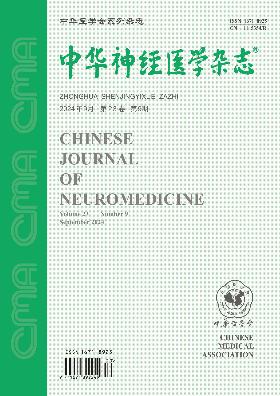Related factors affecting postoperative pneumonia in patients with cavernous cerebrovascular malformation
Q4 Medicine
引用次数: 0
Abstract
Objective To explore the related factors affecting postoperative pneumonia in patients with cavernous cerebrovascular malformation (CCM). Methods Clinical data of 151 CCM patients admitted to our hospital from January 2010 to January 2017 were retrospectively collected. Patients were divided into postoperative pneumonia group (n=11) and postoperative non-pneumonia group (n=140) according to the occurrence of postoperative pneumonia. Univariate Logistic regression analysis, multivariate Logistic regression analysis and receiver operating characteristic (ROC) curve were used to screen the relevant factors influencing the occurrence of postoperative pneumonia in CCM patients and evaluate the predictive value of relevant factors in postoperative pneumonia. Results As compared with patients from postoperative non-pneumonia group, patients from postoperative pneumonia group had significantly increased modified Rankin scale (mRS) scores and significantly higher percentage of CCM combined with hemorrhage, and significantly decreased Glasgow coma scale (GCS) scores (P<0.05). Multivariate Logistic regression analysis showed that preoperative GCS scores (OR=4.75, 95%CI: 1.14-19.80, P=0.032) and mRS scores (OR=15.61, 95%CI: 3.22-75.58, P=0.001) were independent factors influencing the occurrence of postoperative pneumonia. ROC curve showed that the sensitivity and specificity of mRS scores≥4 to predict postoperative pneumonia were 45.5% and 95.7%, respectively, and the sensitivity and specificity of GCS scores≤13 to predict postoperative pneumonia were 54.5% and 85.7%, respectively. Conclusion For CCM patients with preoperative GCS scores≤13 or mRS scores≥4, more attention should be paid to perioperative lung management and occurrence of postoperative pneumonia should be vigilant. Key words: Cerebral cavernous malformation; Postoperative pneumonia; Modified Rankin scale; Glasgow coma scale影响海绵状脑血管畸形术后肺炎的相关因素
目的探讨影响海绵状脑血管畸形(CCM)患者术后肺炎的相关因素。方法回顾性收集2010年1月至2017年1月我院收治的151例CCM患者的临床资料。根据患者术后肺炎的发生情况分为术后肺炎组(n=11)和术后非肺炎组(n=140)。采用单因素Logistic回归分析、多因素Logistic回归分析及受试者工作特征(ROC)曲线筛选影响CCM患者术后肺炎发生的相关因素,评价相关因素对术后肺炎的预测价值。结果与术后非肺炎组比较,术后肺炎组患者改良Rankin量表(mRS)评分显著升高,CCM合并出血比例显著升高,格拉斯哥昏迷量表(GCS)评分显著降低(P<0.05)。多因素Logistic回归分析显示,术前GCS评分(OR=4.75, 95%CI: 1.14 ~ 19.80, P=0.032)和mRS评分(OR=15.61, 95%CI: 3.22 ~ 75.58, P=0.001)是影响术后肺炎发生的独立因素。ROC曲线显示mRS评分≥4分预测术后肺炎的敏感性和特异性分别为45.5%和95.7%,GCS评分≤13分预测术后肺炎的敏感性和特异性分别为54.5%和85.7%。结论术前GCS评分≤13分或mRS评分≥4分的CCM患者,应重视围手术期肺管理,警惕术后肺炎的发生。关键词:脑海绵状血管瘤;术后肺炎;改良Rankin量表;格拉斯哥昏迷量表
本文章由计算机程序翻译,如有差异,请以英文原文为准。
求助全文
约1分钟内获得全文
求助全文
来源期刊

中华神经医学杂志
Psychology-Neuropsychology and Physiological Psychology
CiteScore
0.30
自引率
0.00%
发文量
6272
期刊介绍:
 求助内容:
求助内容: 应助结果提醒方式:
应助结果提醒方式:


